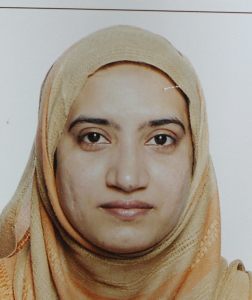The New York Times reported this weekend that U.S. officials approved San Bernardino murderer Tashfeen Malik to immigrate to the U.S.–even though she had gushed about jihad on social media.
Malik entered the U.S. on a K-1 (fiancée) visa and held a Pakistani passport. In order to receive the visa, an applicant must endure three background checks–each of which failed to catch Malik’s social media posts:
First, Homeland Security officials checked her name against American law enforcement and national security databases. Then, her visa application went to the State Department, which checked her fingerprints against other databases. Finally, after coming to the United States and formally marrying Mr. Farook here, she applied for her green card and received another round of criminal and security checks.
Ms. Malik also had two in-person interviews, federal officials said, the first by a consular officer in Pakistan, and the second by an immigration officer in the United States when she applied for her green card.
All those reviews came back clear, and the F.B.I. has said it had no incriminating information about Ms. Malik or Mr. Farook in its databases. The State Department and the Department of Homeland Security have said they followed all policies and procedures. The departments declined to provide any documentation or specifics about the process, saying they cannot discuss the case because of the continuing investigation.
Former FBI executive assistant director Shawn Henry said the visa program is muddled with fraud.
“We have heard about this fiance visa and I know the U.S. Government has some concerns in that program,” he told MSNBC. “There’s a high percentage of fraud and that is again another avenue potentially from people who want to do harm here to pursue.”
However, Malik’s detailed and violent posts did not raise any flags. It appears immigration officials “do not routinely review social media during their background checks” while the Department of Homeland Security cannot decide if they should make it part of the process.
At National Review, Jonah Goldberg points out that the Times never explains why Homeland Security cannot come to a consensus on the topic. The article does not even explain what the posts said or why they are horrific.
“It’s almost as if the Times is scared to actually report the interesting facts–what the posts said, why the government ignores them and may want to keep ignoring them etc. for fear of what people might do with the facts,” writes Goldberg.
Goldberg notes that the news article ends unusually– with words of caution, lest the reader draw the wrong conclusions about Muslims on social media:
Social media comments, by themselves, however, are not always definitive evidence. In Pakistan — as in the United States — there is no shortage of crass and inflammatory language. And it is often difficult to distinguish Islamist sentiments and those driven by political hostility toward the United States. At the time Fehda Malik’s comment was posted, anti-American sentiment in Pakistan was particularly high; four months earlier, American commandos had secretly entered Pakistan and killed Osama bin Laden.
In addition to social media, the government has confirmed that authorities are searching for other red flags they missed.
“Everyone’s asking the same questions about how it is that law enforcement didn’t know, or intelligence officials didn’t know–that they could have flown under the radar and nothing gave an indication that they were a threat,” said Rep. Jim Langevin (D-RI), member of the House Homeland Security Committee, according to ABC News.
FBI Director James Comey and others spoke with members of Congress in a closed-door briefing on Thursday. Rep. Will Hurd (R-TX) did not tell the media what evidence caused “investigators to conclude that the couple had radicalized independently as early as 2013.”

COMMENTS
Please let us know if you're having issues with commenting.